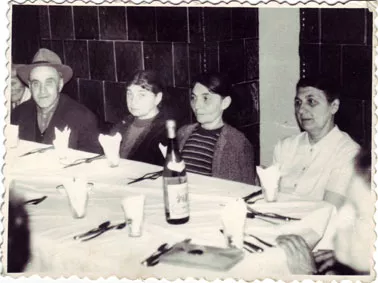The Cojocariu sisters
This is a photograph of us, the 3 sisters. From right to left: my eldest sister, Malca Cojocariu, the second born, Neti Cojocariu, and I, the cadet, Fani Cojocariu. I no longer know who the man in the photograph is, he isn't one of us, he isn't a relative of ours. How contorted my face was! The photograph was taken at a Passover celebration party - Seder Nacht -, at the canteen of the Jewish Community of Dorohoi, but I don't know what year it might be, there is nothing written on the back.
We had a Community canteen, it was in operation for about 30 years. It was a very good thing to have, this canteen. We had a meal we could count on, a piece of meat - for there was a dish with meat almost daily, it was rare when there wasn't meat on the menu. I had a reason to go out now and then, and it makes a difference to have the table set, ready for you. They brought me the food home lately, for I collapsed many times here, on the stairs of my block of flats. The canteen was closed a few years ago, for there are few Jews left, and there was no one to run it. In fact, I think we don't have a canteen anymore since 1994.
We lived together, all 3 of us. My eldest sister knew dressmaking, the second-born knitted, and I helped her. My eldest sister had a sewing machine. And then the second-born sister bought one, but she sold it, for it was old and she didn't like it. She could sew her own clothes, make her own dresses, this and that. We worked at home. Sweaters, gloves, socks - we sewed most anything. People could see my sister was doing a good job, that she was skilled and talented even, and people came to her by word of mouth. They came to our house and placed an order, depending on what each of them wanted done. There was a time when Brasov wool was the material of choice - that was its actual name -, a sort of prime wool, as it were, dyed in all sorts of colors. But many people asked us why we didn't get a steady job. A textile factory had been opened there for the first time, and people told us: "Girls, why don't you apply for a job there? So that you might have some pension money when you grow old." Well, none of us entered a steady job. We all carried on doing what we had been doing.
Then we separated, my sisters moved out one after the other, they moved somewhere else. The eldest was the first to leave, she moved in a studio flat, while the second-born and me remained in our former parental home. Well, the second-born sister had started to catch on by then. For we led a very hard life there. We didn't make a fire there after our father passed away, we stopped using the stoves. There was smoke everywhere in our house. Our house was located near the street, and in wintertime, during the most biting frost we opened the door. People passed in front of the door, and I used to say: "I wonder what these people are thinking. 'Look, it's too hot in there!'" But the stove let out so much smoke, you couldn't see in front of you. So that's why we didn't have any heating anymore. By then, people started urging us. There were many Jews, they lived on every street. A woman used to come by our place, she told us: "Why don't you leave? You have no family, you don't have a proper house - why are you staying here instead of leaving?" For people were leaving for Israel in great numbers. But you think we heard that from only one Jew? Well, we didn't manage to do this either, leaving, that is. And we stayed. There is a saying, to the effect that the worm gnaws its way inside a horseradish and says that one can live there as well. There are worms that eat and prefer horseradish, which is actually so hot. That's how it was with us - just like the worm, we had gnawed our way inside the horseradish and wouldn't leave anywhere, neither here, nor there, not for the world. Well, that's how it was and that's how we stayed.















